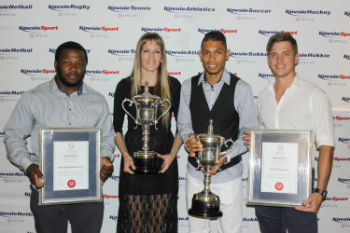 The pride of KovsieSport. From the left, are: Ox Nche
(UFS Junior Sportman of the Year), Karla Mostert
(Senior Sportswoman of the Year), Wayde van Niekerk
(Senior Sportsman of the Year), and Brett Walraven
(on behalf of his sister, Nicole Walraven – Junior Sportswoman of the Year).
Photo: Hannes Naude
|
The journey does not belong to him alone, but to everyone at
KovsieSport.
These were the words of University of the Free State’s (UFS)
Wayde van Niekerk, after being named as KovsieSport’s Senior Sportsman of the Year on Wednesday 21 October 2015.
The South African sports star walked away with the award for the third consecutive year, while the Protea netball defender,
Karla Mostert, was crowned Senior Sportswoman for the first time.
The Junior Bok,
Ox Nche, and the Protea hockey player,
Nicole Walraven, were named as Junior Sportsman and Junior Sportswoman of the Year respectively.
Nche represented South Africa’s U20 rugby team this year at the Junior World Championships, played for the Shimlas, and was named the UFS Rugby Club’s best junior player.
Walraven made her debut for South Africa in 2015. She was crowned jointly as the best player at the Provincial U21 tournament, and was also Hockey South Africa’s U21 Player of the Year.
Van Niekerk won gold in the 400 metres at the
World Championships in Beijing, becoming only the fourth athlete in history to run the 400 m in less than 44 seconds, and the 200 metres in less than 20 seconds.
“This is precious, and something I will cherish as an athlete: being part of KovsieSport,” he said.
“I arrived at the UFS as a high school boy, started as a junior, and was accepted immediately.”
“I really appreciate everybody who played such a huge part in my life.”
Mostert was named as Player of the Series in the Brutal Fruit series, as well as the Varsity series this year. She was also a star for the Proteas at the World Cup.
“This (the award) is definitely a good way to end my time at Kovsies. This is something one is trying to achieve for years, so it really is a highlight.”
She said it was difficult to describe how much KovsieSport is doing for its athletes, and this was the reason why the UFS achieves so many successes in sport.